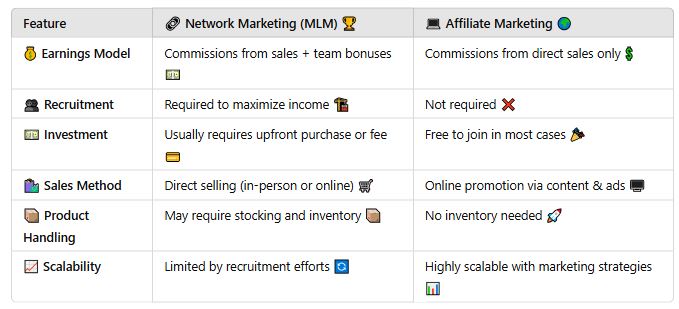In the world of business and sales, network marketing and affiliate marketing are two popular models that individuals use to generate income.
While both involve selling products or services and earning commissions, they differ significantly in structure, strategy, and potential earnings.
The world is changing and we’ll also look at some companies that are starting to combine the two structures in an effort to give distributors more ways to earn.
This article breaks down these differences and provides examples of well-known companies operating in each sector.
What is Network Marketing?
Network marketing, also known as multi-level marketing (MLM), is a business model where individuals sell products directly to consumers while also recruiting others to join their sales team.
The main source of income in network marketing comes from both personal sales and commissions earned from the sales of recruits within a distributor’s downline.
Unfortunately there have been some unscrupulous companies and people involved in this industry that have given it a bad wrap.
There are unscrupulous and shady people in every industry but I think what hurts this industry the most is that when people or companies take advantage of people in this space it hurts more and cuts deeper because many people are emotionally invested in their business.
When something goes wrong, we’re talking about smashed hopes and dreams… not just losing a little money.
Key Characteristics of Network Marketing:
- Multi-Level Structure: Earnings come from personal sales as well as the sales made by recruited team members.
- Recruitment-Based Growth: Expanding one’s team is often essential to maximizing earnings.
- Direct Selling: Distributors typically promote and sell products directly to consumers.
- Initial Investment: Many companies require new members to purchase a starter kit or pay a registration fee.
Well-Known Network Marketing Companies:
- Amway – Specializes in health, beauty, and home care products.
- Herbalife – Focuses on nutrition and weight management products.
- Avon – Sells beauty, skincare, and wellness products.
- Mary Kay – Known for cosmetics and skincare products.
- Forever Living Products – Offers aloe vera-based health and beauty products.
- Tupperware – Sells kitchenware and food storage products.
What is Affiliate Marketing?
Affiliate marketing is a performance-based online marketing strategy where individuals (affiliates) promote a company’s products or services and earn commissions based on sales generated through their referral links.
Unlike network marketing, affiliate marketing does not involve recruitment and affiliates do not have to purchase or stock products.
There are different types of affiliate income such as high-end expensive digital products as well as cheaper physical products.
I’ve participated in both and they both have benefits and drawbacks.
For example, I’m an Amazon affiliate. When people go to Amazon and purchase from one of my links, I get a small kickback.
The benefit is Amazon as a brand has trust with virtually everybody.
So if somebody goes to their site, they will not hesitate to buy what they want.
The drawback is that it takes a lot of visits and sales to make decent income.
I’ve also participated in high end digital training as an affiliate.
I’ve made over $100,000 flipping land and I went through at least 3 land courses to learn how to do that.
The one I learned the most from (Jack Bosch’s Program) is the one I promote and get a kickback from.
The benefit is I make more per sale.
The drawback is that it’s a much more expensive sale and has a much lower conversion rate.
Now let’s get back to affiliate marketing basics and how it’s different from network marketing.
Key Characteristics of Affiliate Marketing:
- Single-Level Structure: Earnings come solely from commissions on referred sales.
- No Recruitment Required: Affiliates do not need to build a team to earn.
- Online-Based Sales: Primarily uses blogs, websites, social media, and email marketing to drive sales.
- No Initial Investment: Affiliates can join for free and start earning without upfront costs.
Well-Known Affiliate Marketing Programs:
- Amazon Associates – Amazon’s affiliate program allows users to earn commissions by promoting products on the platform.
- Shopify Affiliate Program – Offers commissions for referring new users to Shopify’s e-commerce services.
- ClickBank – A marketplace with digital products that affiliates can promote and earn commissions from.
- CJ Affiliate (formerly Commission Junction) – A large affiliate network with various brands and products.
- Rakuten Advertising – Connects affiliates with major retail brands for commissions on sales.
- Bluehost Affiliate Program – Pays commissions to affiliates who refer customers to its web hosting services.
Key Differences Between Network Marketing and Affiliate Marketing

Which One is Right for You?
- Choose Network Marketing if: You enjoy direct selling, networking, and team-building, and don’t mind an initial investment.
- Choose Affiliate Marketing if: You prefer online marketing, content creation, and earning passive income without recruitment or direct sales.
Both business models offer opportunities for earning income, but affiliate marketing is often considered more flexible and accessible for beginners, while network marketing can be lucrative for those who excel in sales and recruitment.
What if you like both models?
If that’s the case, check out one of the companies below or check out what we are currently doing… It’s a blended or hybrid model.
Companies That Combine Network Marketing with Affiliate Marketing
While network marketing (MLM) and affiliate marketing are often seen as separate business models, some companies have found innovative ways to blend both strategies.
These hybrid companies allow individuals to earn commissions through direct sales (affiliate marketing) while also offering multi-level earning opportunities through team-building (network marketing).
Below, we explore a few well-known companies that successfully integrate both models.
1. MyDailyChoice
Industry: Health, Wellness, and CBD
How It Combines Both Models:
- MyDailyChoice offers an affiliate-style commission structure where individuals earn from product sales through unique referral links.
- It also has a multi-level marketing (MLM) aspect where affiliates can build teams and earn bonuses from their downline’s sales.
- No mandatory product purchases or autoships are required to earn commissions, making it attractive to affiliate marketers.
Why It Stands Out:
✅ No upfront fees to join
✅ Affiliate-style commissions without needing to recruit
✅ MLM team-building for those who want residual income
2. Young Living
Industry: Essential Oils & Wellness Products
How It Combines Both Models:
- Young Living operates as an MLM company, allowing members to build a team and earn commissions from their recruits.
- At the same time, it provides an affiliate program where people can simply refer customers via a unique link and earn commissions without recruitment.
- Affiliates who prefer not to engage in MLM can still benefit from single-level commissions.
Why It Stands Out:
✅ Offers both retail commissions (affiliate-style) and residual income (MLM)
✅ Customers can join as “brand partners” or just as affiliate sellers
✅ Well-established reputation in the essential oils market
3. Avon
Industry: Beauty & Personal Care
How It Combines Both Models:
- Avon has long been known as a traditional direct-selling MLM, but it has evolved to integrate affiliate marketing.
- Representatives can sell products directly through personal websites and earn commissions without needing to recruit others.
- However, those interested in MLM can also build a team and earn from their downline’s sales.
Why It Stands Out:
✅ A legacy brand with strong consumer trust
✅ No pressure to recruit—sales reps can act as pure affiliates
✅ Digital tools for online sales, bridging MLM and affiliate marketing
4. Modere
Industry: Health, Wellness, and Clean Living
How It Combines Both Models:
- Modere allows individuals to promote its products through shareable affiliate links, earning commissions on sales.
- Unlike traditional MLMs, it focuses more on customer referrals than recruitment, reducing the “pyramid-like” stigma.
- Those who choose to recruit others can still earn bonuses from their team’s performance.
Why It Stands Out:
✅ Strong customer referral program that mimics affiliate marketing
✅ Hybrid earning opportunities for both sellers and recruiters
✅ No requirement to recruit or maintain a downline to earn commissions
5. LifeVantage
Industry: Nutritional Supplements & Anti-Aging Products
How It Combines Both Models:
- LifeVantage uses an affiliate-style model for selling products online while incorporating MLM-style commissions for those who build teams.
- Individuals can simply refer others and earn retail commissions without recruitment.
- Those who prefer the MLM approach can recruit and earn from their downline’s sales.
Why It Stands Out:
✅ Online sales tools for affiliate-style marketing
✅ Multi-level commission opportunities for network marketers
✅ No mandatory inventory stocking
Conclusion
These hybrid companies offer the best of both worlds: the flexibility of affiliate marketing with the residual income potential of network marketing.
Whether you prefer earning through direct sales alone or want to build a team for long-term commissions, these businesses provide multiple pathways to success.
If you’re looking for a side hustle or a full-time opportunity, choosing a company that blends both models could give you more earning potential and flexibility.
Other Interesting Articles:
What is Network Marketing?.. How Does it Work?
Network Marketing Quotes
Network Marketing vs. Traditional Business
If you’d like a personal relationship with Jesus Christ, visit our salvation page.
If you’d like to join our team in what we are doing, please reach out.
God Bless,

Jason and Daniele


